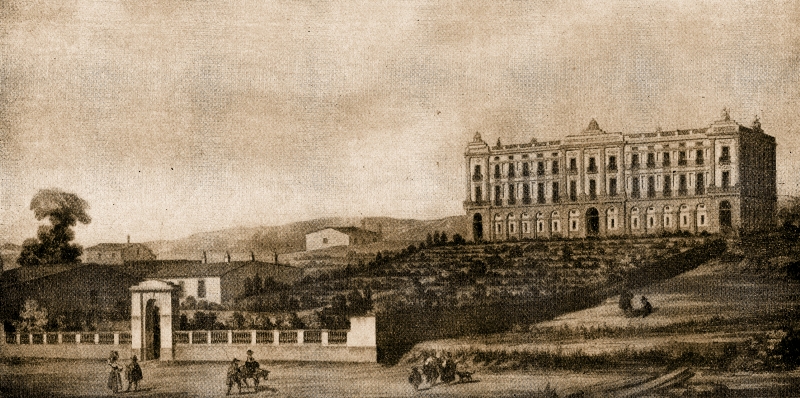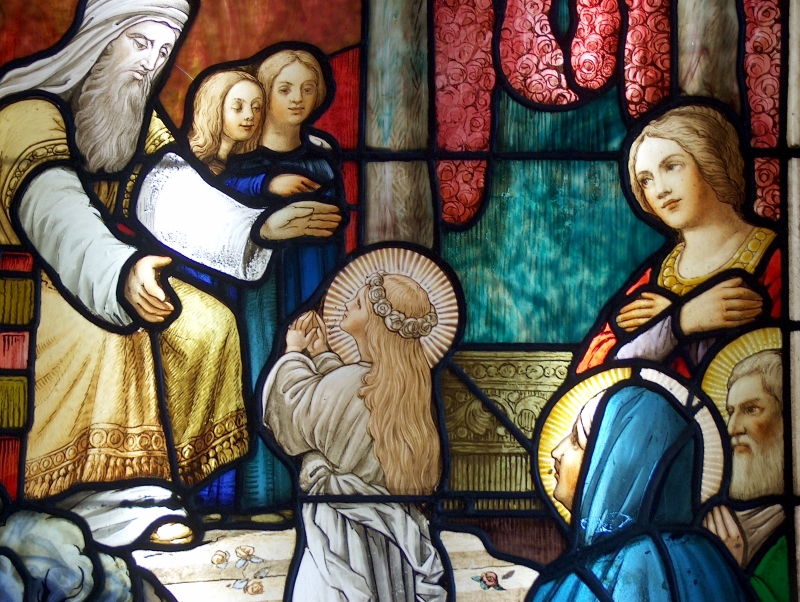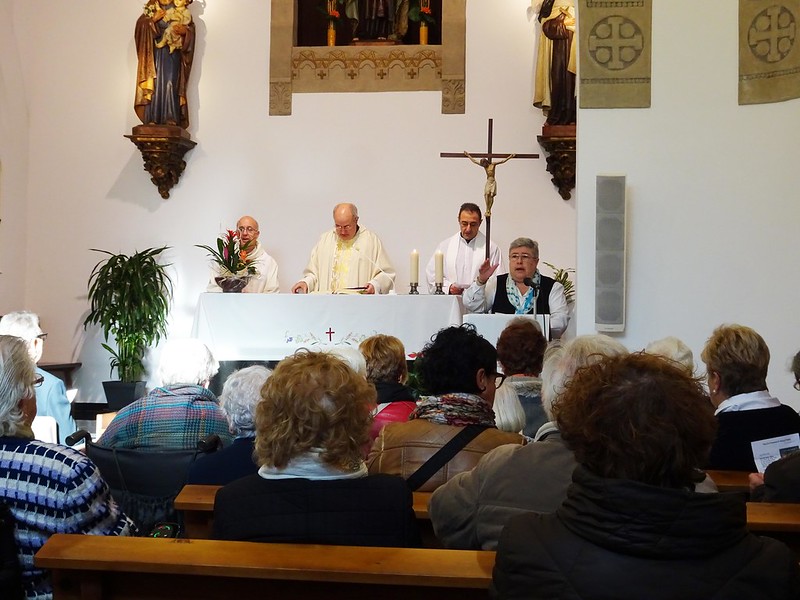Province of Spain
A synthesis of the history of the Province
The first community of our sisters arrived in Arenys de Mar, a small coastal village of that time in 1867. Our Congregation was invited there to take over a hospital-asylum. This was the time when public and private organizations were looking for Congregations to carry out their projects for the most underprivileged population: children, elderly, sick and working women.
The good reputation brought by our first sisters led priests and lay people to seek their collaboration in pastoral and social ministries. At the same time, some families of their benefactors wanted the sisters to take care of the education of their daughters. Our first schools in Spain were born to respond to this need and to offer financial sustainability for social services. In the first 35 years of its presence in Spain, the Congregation founded nine houses; seven charitable centers in the style of the time and two schools, all in Catalonia. Their attempts to expand to other regions did not bear fruit as the Bishops refused due to the large number of Congregations already existing in their dioceses responding to all their needs.

In 1903, a new law in France changed the course of our mission in Spain. The Ley Combes, prohibited teaching of religious in France and this meant that many sisters who were educators went to Spain to offer their services. This reality called us to open new schools where they could carry out their mission. In the years that followed, seven schools were opened, one center for social work and sisters collaborated in two clinics for a few years.
During those years, only one school was able to maintain its life and mission with a certain amount of normalcy, the sisters were forced to leave from all the other houses and go abroad or live a hidden life with their families. When the war was over, the most urgent need was to rebuild and reopen houses, most of them were seriously damaged; some of them, including Las Corts, would never completely recover from it. Due to the precarious situation of the country, some social projects and other humanitarian projects were started, with the former students of the schools and the sisters also tried to resume health care.
When the Province was finally erected in 1959, there were 160 sisters in thirteen communities. In agreement with the second Vatican Council directives, the sisters entered into various fields of mission: residences for young working girls and students, small insertion communities in towns and popular neighborhoods, homes for children, communities in public hospitals, nurseries and presences in education, health care and social services with necessary agreements.
The sense of fraternal solidarity in the Congregation has been shown by sending sisters to Algeria, Brazil, Burkina Faso, Cameroon, Colombia, Ivory Coast, France, Honduras, England, Israel, Italy, Nicaragua, Switzerland and Venezuela.
How many are we today?
The Province is composed of 49 sisters present in 9 communities in different parts of the country. Wecollaborate in 5 dioceses of Spain.
From our Province, there are sisters involved in the mission in Honduras and the General Government.
The International character of the Congregation is increasingly evident in our Province. There are many nsisters from other structures who come for study or formation and they remain among us for a while.
What is our mission?
Let us take a look at the different apostolic commitments of the sisters in the nine communities of the Province with some simple details. Here we will see a great number of our missionary responsibilities, certainly not in their totality, because to give witness is much more than "carrying out activities". In every action, is always something beyond that only God knows and can value.
COMMUNITY OF BELLAFILA - BARCELONA: The sisters of this community assume the project “Mary, Queen of Peace”, a residence for students where they welcome and care for young university students and coordinate an association of Nursery children. One sister offers service as a teacher in the university. At the Provincial level they assume the responsibility of the school in Reus and the Means of Social Communication of the province. They help to take care of the publication of the newsletter of the Province, “Avisos, comunicados y anécdotas” and the web page of the Congregation and of the Province.
COMMUNITY OF CASA PROVINCIAL - BARCELONA: The specific mission of this community is to welcome sisters and others who visit the house since it is the seat of the government of the Province. The sisters are responsible for the Treasurer’s office and offer voluntary services at the association called Ekumene, give classes in Spanish to immigrants and prison ministry, they also teach in the school in Reus. The sisters offer services at the Provincial level as councilors, provincial secretary, formation commission and delegate of MSC, the publication of “Avisos, comunicados y anécdotas” and in updating the webpage of the Congregation.

COMMUNITY OF BUFALÁ-ROCA I PI - BADALONA: This community lives and exercises its mission in a home for the elderly in Roca i Pi Foundation through pastoral care and accompaniment of its residents and their families. They also accompany mourning families of the former residents. Animation of liturgy in the residence and in the parish are part of their services. One of our sisters is part of the pastoral council of the parish. Family catechesis and the coordination of catechists is an apostolic work to which they pay special attention and care.They participate in the different associations of the parish: SOMHI group for the elderly and Vida Creixent group of the parish.A sister is responsible for the maintenance of the sisters’ cemetery in the Province.
COMMUNITY OF GRACIA - BARCELONA: This community is constituted by the sisters who either by their age or sickness needs specialized care and the sisters who care for them. They work in direct collaboration with the St. Camillus Association. By its specific nature, the community welcomes other sisters who are sick. Their principle mission is prayer, the power by which they nourish and strengthen the Province. Personal care is very important but they have a special zeal for spiritual nourishment from which they receive strength to assume and live the realities of each moment.
COMMUNITY OF LOURDES - BARCELONA: By its nature, this community shares the living space in the house of Rosellón where the sisters participate in offering their services at the reception desk of the Provincial House and accompany our sick sisters. They also welcome and accompany the association of our former students, offer voluntary services at the association called Ekumene, giving classes in Spanish to immigrants. They support “Manos Unidas” and participate in the group called Vida Creixent.
COMMUNITY OF MADRID: This Community is polyvalent in its apostolic activities. Its members work in Church institutions and conference of religious at the national level: CONFER pastoral service in the prison of Alcalá-Meco and follow-up visits to emigrants in the Center for the Foreigners of Aluche. They collaborate in health ministry in the Hospital San Juan de Dios, with the sick and their families, in the "Betania" project, giving Spanish classes to children who live in foster homes and in the parish, adult catechetical groups and work with Caritas.
In collaboration with different Dominican Congregations, they are involved in the fight against the trafficking of women in a project called Human Rights Observatory "Samba Martine" which networks with other projects such as Caritas, Adorers or Oblates among others. At the Provincial level, they collaborate with the Provincial council, Provincial administration, formation commission, maintenance of the archives and as delegate for Justice and Peace.
COMMUNITY OF PONT D'INCA - MALLORCA: The specific mission of this community is to offer welcome, help and accompaniment to the children, teachers, parents and staff of the School. The sisters collaborate in administration, they offer their services in the refectory, reception and coordinate extracurricular activities and they take care of maintenance, motivation and coordination of the solidarity projects in the School. They are present in the pastoral council of the school, teaching catechism for first Holy Communion and visit to the sick, as a parish ministry. They also share Lectio Divina with a group of lay people. At the level of the Congregation, they assume the coordination of the team of solidarity projects, and through the NGO "Mallorca Amiga", they motivate and work with the whole school community to support development projects. They lend their collaboration to the Province in the Provincial Council, the Council for Economic Affairs and the Commission of Formation.
COMMUNITY OF REUS - TARRAGONA: It is an educational community that works in close collaboration with the laity in the mission in the School: pastoral activities, direct collaboration by complementary services in the canteen, welcoming the students in the morning, motivating and organizing solidarity activities and administration of the School.
The sisters of this community welcome, assist and accompany the families of emigrants, especially Muslims who bring their children to the Centre and visit the sick people. At the Provincial level, they participate in the Provincial council, Finance Council and the secretariat of the Dominican family.
COMMUNITY OF ROQUETAS DE MAR - ALMERÍA: This community is greatly involved in the parish and in its social and economic context where migrants from sub-Saharan Africa represent almost 90% of the population. They receive homeless people with serious social problems; they help migrants in the management of their documents, social security and job search. They assume the direction of the Association "Verde Mar"(Green Sea) through which they receive subsidies from the government of Andalucía and fulfill procedures to obtain resources from the food bank of the government. At the Provincial level, they participate in the Finance Council. Their mission also involves spiritual and liturgical animation in the parish.
What innovations have we made in recent times?
The 54th General Chapter left us the task to reflect and act in such a way that the communities will becomea place of life and missionary commitment in the Structures and will fulfil the role of animation andformation.
Without a doubt, we have dedicated much of our time for reflection and search for the formation and composition of communities, bearing in mind that they offer the processes necessary for maturation, human and spiritual well-being of each sister and the integration of personal gifts and limitations to ensure the missionary projects, the raison d'être of each community.
We will mention here two important initiatives of the Province that we consider are of special significance:
- INFIRMARY OF THE PROVINCE - COMMUNITY OF GRACIA: We began a serious reflection in thiscommunity on the management ofthe house to ensure a better qualityof life to our elderly sisters and tomake better use of humanresources.
Knowing about the program of St. Camillus Foundation for the attention and care of the elderly and sick religious in different Congregations, we started to contact this foundation. Its non-profit character, foundational purpose and organizational structure were some factors, among others that led us to take the decision to sign a contract with them for the MANAGEMENT AND COORDINATION of the healtcare services in the Province. The commitment assumed by the Foundation for the Congregation are:
- To provide the required socio-nursing care for the sisters residing in the infirmary.
- Organize and distribute the staff and their work by appointing a supervisor for the center.
- Coordinate the activities of care with the person designated by the Congregation.
- To advise the Congregation in matters related to the service provided by the Foundation.
- Respect the Charism and values proper to the Congregation.
The staff that the Foundation has assigned for nursing work closely with the Superior of the community and the sisters who collaborate with her. They are ultimately responsible for the personal and spiritual care of the sick sisters. We have also expanded the nursing and geriatric services by appointing a person with a diploma in occupational therapy to the team to develop activities that provide animation, sensory and motor stimulation to the sisters, on two afternoons during the week.
Some communities of the Province also participate in the animation of the infirmary in Gracia, sharing information, recreational activities and most importantly closeness and fraternal affection.
- DOMINICAN FAMILY PROJECT - COMMUNITY OF MADRID: Pope Francis' call to go out to the peripheries was a wakeup call for us to the possibility of making it real. For this reason, we set out on this move by sending two sisters to the community of Madrid to become part of the group of Dominicans who were to begin a project on the occasion of the celebration of the Jubilee of the Order.
In the beginning of the reflections, this project was basically oriented towards the fight against the trafficking of women for labor and sexual exploitation.
Difficulties arose by the lack of direct involvement of some Dominican Congregations that had assured their participation and others for an organizational issue left the project.
After much search and consultations, the project was redefined as creation of a network for Human Rights Watch, in which people and the Dominican Family came together, working in a coordinated manner to accompany and defend those whose human rights are violated in any way, especially victims of human trafficking and migrants.
It is called "Samba Martine" and has its seat in Madrid, in a house that the Dominicans set aside for this purpose. Its objective is currently being deployed in three areas: reflection, promotion-sensitization and intervention.
Our sisters were not only personally involved in the process, but they have awakened concern and commitment of the whole community in the project. And they have moved further: they are part of the Inter-Church Group made up of Caritas, CONFER, White Cross Foundation, Justice and Peace, Amaranta and Secretariat of the Migration Foundation of the Episcopal Conference.
They also consult, learn and collaborate with other congregations that have long and interesting experience in these problems: the Adorers who run the "Hope" project and the Oblates with "Your House" project.
We must recognize with gratitude that this new form of apostolic work is allowing us, from our poverty, to commit ourselves as Church and in Church to fight for the dignity and defense of human rights, to work hand in hand with other Congregations and to create a network with institutions committed to the same cause.
What are our challenges as a Structure?
IN THE PROVINCE...
- One of the challenges is apostolic commitment and the desire for communities to be true places where spiritual life is strengthened, the richness of fraternity is lived and prayer is shared.
- Encourage and strengthen the transmission of human and Christian values to the younger generations.
- To make our life a true evangelical witness, in any place and at any time starting from our own reality and the society in which we are inserted.
- Strengthen our spiritual vigor and transmit the joy of following Jesus Christ according to the Charism for mission.
- Another great challenge for the Province is that of working for the missions, which, although weak in some areas, are strong in commitment and dedication. For this reason, we support communities and keep alive the flame of mission, with concrete, organized or sporadic help.
- To be a welcoming Province. One of our possibilities, from our poverty and simplicity, is to open doors fraternally to other structures, to offer them the service of welcome. For sisters who wish or need to come for higher education, formation or share our mission, there will always be a place for them in our communities and in our hearts.
- Finally, another great challenge is the work of restructuration that the General Government now proposes to the Congregation as an unavoidable task and has to do with its structural, administrative, economic and obviously, personal reorganization.
Photo album
Download PDF newsletter




